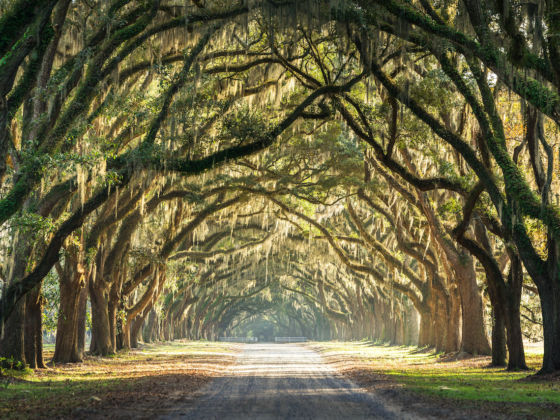“SAVANNAHIANS ARE THE LUCKIEST people in the world,” declares interior design author Charles Faudree at the 2012 Savannah Book Festival. A year ago, evaluating like the tourist I was, I believed his statement. Now, a local myself, seated behind the blue bloods with the blue hair blocking the alabaster abs of Greek gods in the Telfair Sculpture Garden, I feel lost, not lucky.


My grandparents met and married here in the early 1950s before settling in Atlanta. I stare at my family’s sepia photo that bleeds Eisenhower-era stability into Savannah mythology. This mythology still exists in most travel articles about Savannah: in write-ups of St. Patrick’s Day, the 22 squares, the well-manicured gardens of the Victorian District. I read so much about this lore, I think I know where I’m headed when I get here.
I don’t.
Right away I get tangled in Savannah’s Spanish moss. When I get lost wandering off East Broad Street, I do a double take. The handcrafted white letters of the Black Holocaust Memorial showcase a papier-mâché African-American man in shackles upon a platform, paint peeling. I drive around for a second look.
Most evenings I skip downtown altogether because it often leads to an unplanned all-nighter. Like the time I agree to emcee a burlesque show at the Jinx only to wind up watching Cher’s Burlesque at the Wingmen Motorcycle Club until 7am.
Or the time my car gets trapped in a closed parking deck off Liberty Street. I wait it out with my poet friend, Dalton. We grab coffee at Parker’s, the gas station with the insides that resemble a Whole Foods more than a Texaco, and head across the street to McDonough’s Irish Pub. As we take a patio seat in the freezing November night, I stare at the empty Drayton Towers that eclipse the steeples of St. John the Baptist.
Once upon a visit, I spent a drunken night in those towers at a party. Our host, an Irish Catholic, was horrified when he walked in on me changing in front of the window facing the church, as if my nakedness were offending God.
“There are more Irish politics at McDonough’s than in the whole of Ireland,” I whisper to Dalton as a polished but drunken man approaches our table.
-
- “I don’t look like a bad person, do I?”
“No,” I say uneasily.
“Would you believe I killed two men in Ireland?”
I freeze in my corner against the brick.
- “I’m an ex-British army officer and I killed two men in Belfast,” he repeats and grips my arm.
An hour later I’m using pop psychology to placate his guilt and defuse my fear. Eventually, he stumbles back into the green glow of the bar light. Dalton and I grab our coats and make an escape, looking over our shoulders as we sprint down the broken cement, past the green pub, snaking around the drunk and the tipsy ones on the street. When we stop, my gaze veers up, up towards the Drayton Towers. Did I leave part of myself up there, still naked and offending God?
No. My feet are planted firmly on the crumbling Savannah sidewalk above the yellow-fever bodies buried here long ago. I am still lost, but lucky.